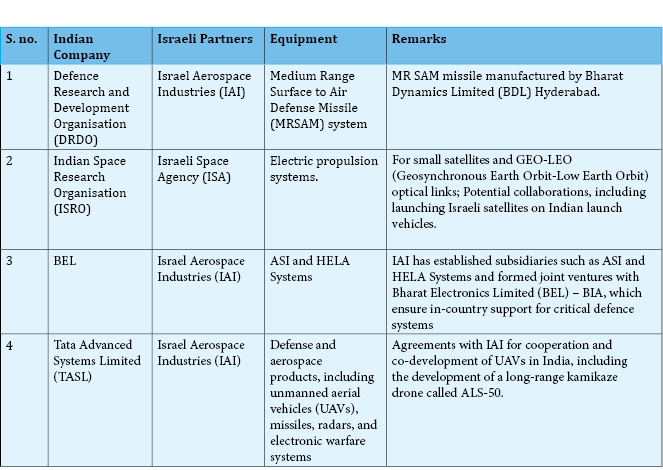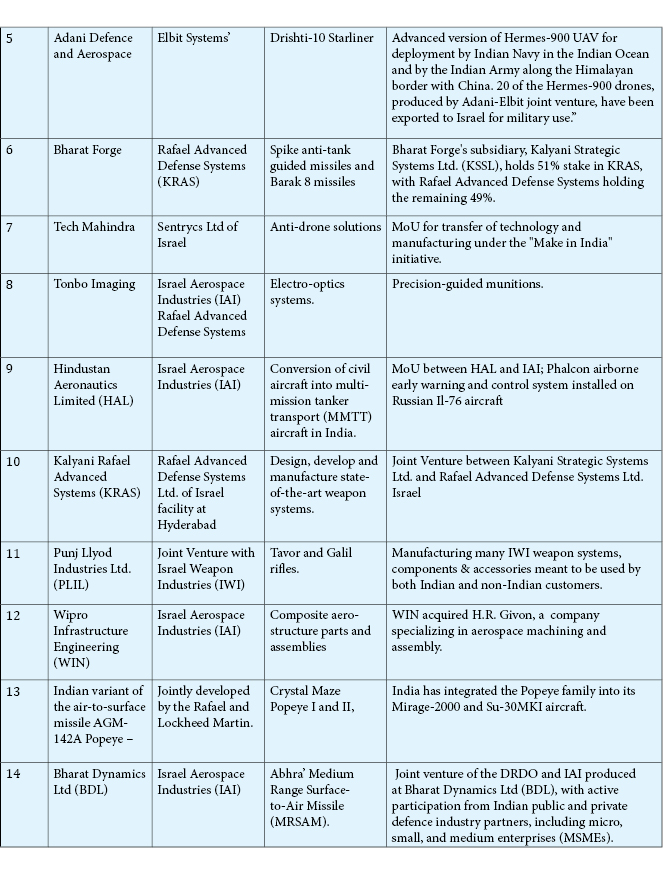
Articles
Israel: Supporting and Powering India’s Military Modernisation through “Atmanirbharta”
Sub Title :
Issues Details : Vol 19 Issue 2 May – Jun 2025
Author : Dr Vijay Sakhuja, Former Director, National Maritime Foundation
Page No. : 63
Category : Military Technology
: June 3, 2025

India and Israel’s defence partnership has deepened steadily, blending shared security concerns with strategic cooperation. Recent events, including support after the Pahalgam terror attack, highlight how Israeli technology and joint ventures are powering India’s military modernisation under the Atmanirbhar Bharat initiative.
Among the many customary outpourings from many governments after the terrorist attack in April 2025 in Pahalgam, Jammu & Kashmir, the Israeli Foreign Minister Gideon Sa’ar assured that his county “stands united with India in the fight against terror”. Further, Reuven Azar, the Israeli Ambassador to India did not hesitate to draw similarity between the terror attack in Pahalgam to the 7 October 2023, Hamas strike on Israel : “There are similarities between the Pahalgam attack and what happened on October 7 (2023) in Israel. Innocent tourists were enjoying their vacation in Pahalgam, while in Israel, people were celebrating a music festival.” Reuven Azar related the timing of the Pahalgam attack with the visits by Hamas leaders to Pakistan Occupied Kashmir (POK), where they reportedly met with Jaish-e-Muhammed operatives and a few others, suggesting possible coordination. It is not known if Israel had shared the above information / intelligence with the Indian agencies, the two countries are strategic partners and among the many bilateral cooperation issues, counter-terrorism standout.
Perhaps the bilateral defence cooperation has thrived at a rapid pace, and over the years Israel has emerged as the fourth largest supplier of military hardware to India. The 2025 SIPRI data on international arms transfers shows that the “largest single importer of Israeli arms was India (34 per cent), followed by the USA (13 per cent) and the Philippines (8.1 per cent).” However, in the overall context of arms imports, Russia constituted the largest portion of India’s arms imports at 36% while western suppliers included France, Israel, and the United States. India has imported US $2.9 billion worth of military hardware from Israel, including radars, surveillance and combat drones, and missiles.
Besides military sales, India Israel bilateral defence relations include high level dialogues (annual India-Israel Joint Working Group (JWG) on Defence, Task Force to formulate a comprehensive Ten-Year Roadmap, Sub Working Groups (SWG) on Defence Procurement & Production and Research & Development, and Service level Staff talks), industry consultations, military exercises and sale / joint development of military hardware as well as technology transfers.
This arrangement is mutually beneficial for both India and Israel. Brig Gen (Res.) Yair Kulas, the head of SIBAT (the International Defence Cooperation Directorate of the Israeli Ministry of Defence) is upbeat and has noted that “India continues to be a key partner for Israeli defence industries, and we see great opportunities in working together, including through joint ventures and local collaborations that align with India’s strategic initiatives. The close cooperation between our Defence Ministries has been instrumental in advancing numerous joint projects, strengthening our bilateral defence ties.”
It is to be noted that the Israeli advanced unmanned systems and precision-guided munitions have proven successful and “allow[ed] for greater flexibility and precision in military operations, pushing towards network-centric warfare capabilities”.
In this context, the performance of the Israeli made military equipment used during Operation Sindoor merits attention. Among the weapons and munitions, the HAROP, a long-range loitering munition (kamikaze type suicide drone) developed by MBT Missiles Division of Israel Aerospace Industries has proven successful. It was effectively used during the Nagorno-Karabakh conflict by Azerbaijan against Armenia. Its “9 hours x 1,000 km range” gives it not only endurance but also assisting standoff operations deep into the enemy battle space without exposing operators to frontline threats. According to The Jerusalem Post, India purchased at least 25 Harop drones in 2009-2019. During Operation Sindoor, in a retaliatory strike, the Pakistan’s major air defence system in Lahore was out of action on 8 May 2025 by using the Harop drones.
Similarly, SkyStriker suicide drones built in Bengaluru by Alpha Design Technologies, in partnership with Israel’s Elbit Systems were central to the destruction of terror camps in Pakistan and Pakistan-occupied Kashmir (PoK). According to Elbit Systems , “As a silent, invisible, and surprise attacker, SkyStriker delivers the utmost in precision and reliability, providing a critical advantage in the modern battlefield. SkyStriker provides manoeuvrable troops and Special Forces with direct-fire aerial-precision capabilities, enhancing situational awareness and survivability.”
The Medium Range Surface to Air Defense Missile (MRSAM) system, known in Israel as the Barak 8, is capable of intercepting targets up to ranges of 70 kilometers. It was jointly developed by the IAI with the Defence Research and Development Organisation (DRDO). According to the IAI, during tests were conducted against four “air targets at various speeds, with challenging interception altitudes and ranges” were intercepted and direct hits were reported. This is an exhibition of the MRSAM system’s “operational capability,” The IAI chairman has stated that “The success of this series of tests strengthens the relationship between our countries and expresses the technological cooperation with our partners in the Indian Ministry of Defence as well as with several industries in both Israel and India,”
The Indian Space Research Organisation (ISRO) and the ISA (Israel Space Agency), the two national space agencies of the respective countries have ongoing collaborations in areas such as electric propulsion systems for small satellites and GEO-LEO (Geosynchronous Earth Orbit-Low Earth Orbit) optical links.
Cyber security collaboration between India and Israel too has been quite significant. The 2017 bilateral agreement to strengthen cyber security cooperation led to the 2020 expanded framework that “facilitated dialogue, capacity building, and regular exchanges”. The June 2022 “Vision Statement” to commemorate 30 years of diplomatic ties between the two countries led to the integration of Israeli advanced cyber security technologies with Indian production capabilities further deepening the defense cooperation.
Finally, India Israel bilateral defence cooperation has now firmly graduated to joint production which is in line with the Indian government’s mission of Atmanirbhar Bharat. In this context, the Israel Aerospace Industries (IAI), contribution is notable. It has made investments in India through
its subsidiary “AeroSpace Services India (ASI); its partnership with IIT Delhi, demonstrating its commitment to the next generation in India; the launch of its NeuSPHERE Innovation Acceleration Program, enabling collaboration with Indian deep-tech startups and most recently; and the opening of its new HELA Systems facility in Hyderabad, enhancing localized Maintenance, Repair, and Overhaul (MRO) capabilities for advanced radar systems and reducing turnaround times for India’s defense forces. These reflect IAI’s ongoing commitment to India’s self-reliance goals under the ‘Make in India’ vision”. Also, these underline the “commitment of the solid partnership between IAI and the Defence Research and Development Organisation (DRDO) in advancing and supporting cutting-edge systems for the Indian armed forces”.
There are positive signs of enhanced “military industrial complex” cooperation between India and Israel and defense planners are upbeat about expanding integration of Israeli weapons, munitions and systems into India’s defence and military infrastructure.
Speaking at the India Israel Business Forum at New Delhi in February 2025, India’s Commerce & Industry Ministry, Piyush Goyal. “There are immense opportunities for collaboration between Israel and India, which will lead to significant geopolitical and economic achievements in the region.” Minister Piyush Goyal further went on to say that “Israel’s capabilities in innovation and security are extraordinary, and the technology demonstrated in ‘Operation Beepers‘[a reference to Israel’s clandestine operation on the Hezbollah terror group in September] is truly inspiring and unique — we want it here too,”




